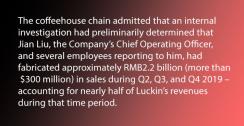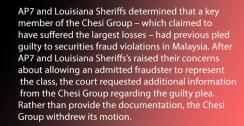Sjunde AP-Fonden (AP7), a fund in Sweden’s premium pension system, and Louisiana Sheriffs’ Pension & Relief Fund have been appointed by the U.S. District Court for the Southern District of New York to serve as co-lead plaintiffs in the pending securities class action alleging that Luckin Coffee Inc. fabricated hundreds of millions of dollars of sales. AP7 is represented by Kessler Topaz Meltzer & Check, LLP, co-lead counsel in the class action.
The class action against Luckin Coffee involves one of the largest cases of securities fraud involving a Chinese company trading on U.S. stock markets. In late January 2020, noted short-seller Muddy Waters Research published an 89-page report alleging that Luckin had fabricated certain financial figures in 2019. The report was based on the review of more than 11,000 hours of store video, more than 25,000 customer receipts, and the Company’s mobile application data, and alleges that Luckin Coffee inflated per-store, per-day sales figures, net selling price per-item metrics, its advertising expenses, and certain revenue metrics.
Luckin Coffee dismissed the Muddy Waters report as containing “misleading and false allegations.” However, on April 2, 2020, the coffeehouse chain admitted that an internal investigation had preliminarily determined that Jian Liu, the Company’s Chief Operating Officer, and several employees reporting to him, had fabricated approximately RMB2.2 billion (more than $300 million) in sales during Q2, Q3, and Q4 2019 – accounting for nearly half of Luckin’s revenues during that time period. After trading above $50 per share in mid-January 2020, Luckin Coffee stock now trades below $4 per share. Before the truth emerged, Luckin raised more than $1 billion from investors when it completed its IPO in 2019, and a secondary public offering in January 2020. The offerings were underwritten by several notable banks including, Credit Suisse and Morgan Stanley.

Scramble to be lead plaintiff
The allegations and Luckin’s admissions have triggered significant interest from the financial press as well as investors seeking to lead the class action lawsuit in the U.S. Following Luckin Coffee’s spectacular collapse in April 2020, 18 movants filed motions seeking to lead the action – no other case filed this year has resulted in more leadership applications. The movants claimed losses ranging from $19 million to $5,000, with AP7 and Louisiana Sheriffs claiming a combined loss of nearly $7 million, third among the movants. While the movant asserting the largest loss is typically appointed as the lead plaintiff, AP7’s investigation uncovered serious concerns with the two movants asserting larger losses. In addition to flagging these concerns, AP7 successfully fended off challenges to its own appointment.
Specifically, competing movants argued that: (1) AP7, as a non-U.S. asset manager, lacked standing under Article III of the U.S. Constitution to assert claims in connection with purchases by its equity fund, and (2) AP7 was an atypical lead plaintiff because AP7’s status as a Swedish pension fund posed a res judicata risk that Swedish courts would not recognize any judgment issued by U.S. courts in this case.
The plot thickens
While AP7 and Louisiana Sheriffs did not assert the largest losses of the movants before the court, their investigation of the two competing movants asserting larger losses – the Chesi Group2 and the Luckin Investor Group3 – uncovered serious deficiencies calling into question their ability to effectively represent the class. Appointing an unqualified lead plaintiff potentially jeopardizes all class members’ claims as a court could deny class certification (and potentially terminating all claims) if the lead plaintiff is deemed to be inadequate. Honesty, trustworthiness, and the ability to actively lead a case are a few of the many criteria used by courts to assess adequacy.
As an initial matter, AP7 and Louisiana Sheriffs determined that a key member of the Chesi Group – which claimed to have suffered the largest losses – had previous pled guilty to securities fraud violations in Malaysia. After AP7 and Louisiana Sheriffs’s raised their concerns about allowing an admitted fraudster to represent the class, the court requested additional information from the Chesi Group regarding the guilty plea. Rather than provide the documentation, the Chesi Group withdrew its motion.
AP7 and Louisiana Sheriffs also raised concerns about the ability of the five unrelated investors comprising the Luckin Investor Group to adequately oversee counsel and zealously represent the class. Indeed, unlike AP7 and Louisiana Sheriffs, the Luckin Investor Group consisted of individual investors that had no experience litigating federal securities claims and who had failed to provide any evidence establishing protocols for the management of the litigation. AP7 and Louisiana Sheriffs further noted that the Luckin Investor Group’s willingness to support the appointment of the Chesi Group (rather than oppose the Chesi Group’s motion) demonstrated inadequate representation.
Given these facts, AP7 and Louisiana Sheriffs argued that they were the movant that asserted the largest financial interest in the litigation and satisfied the Private Securities Litigation Reform Act’s (PSLRA) adequacy and typicality.

The court’s opinion
In appointing AP7 and Louisiana Sheriffs as lead plaintiff, the court rejected the standing and res judicata challenges lodged against AP7 and concluded that AP7 and Louisiana Sheriffs had satisfied the PSLRA’s largest financial interest, adequacy, and typicality requirements. Rejecting arguments challenging AP7’s standing, the court specifically noted AP7’s recent appointments in Ocwen, Goldman Sachs, and General Electric, where courts concluded that concerns about AP7’s standing were not grounded in evidence.
Critically, the court echoed the determination in Goldman Sachs that the movant “opposing AP7’s appointment had not identified a single case in which AP7’s standing was successfully challenged by defendants, and concluded that competing movants had not presented proof that AP7 lacked standing.
Similarly, the court determined that it did not find the res judicata argument persuasive. Specifically, the Hon. Lewis J. Liman explained that res judicata concerns “are not an issue with respect to the selection of Lead Plaintiffs, since those persons will clearly be bound by the judgment of the court,” and acknowledged that “courts routinely appoint foreign investors as lead plaintiffs” and that “foreign lead plaintiffs have been responsible for many large securities class actions.”
Furthermore, the court shared AP7 and Louisiana Sheriffs’s concerns that the Luckin Investor Group would not adequately represent the class. As a threshold matter, the court concluded that the Luckin Investor Group was “a random assemblage” that “does not provide evidence that any member of the group – much less the group as a whole – has had significant involvement in the litigation thus far,” that “the group members provide no plan for communicating with one another across time zones” given that its members were located in Georgia, Toronto, England, Saudi Arabia, and China, and that “there is every reason to believe that the members agreed to be assembled by counsel and to ratify counsel’s representation of them – rather than that they gathered together and engaged in a truly independent selection of counsel.”
In contrast, the court concluded that AP7 and Louisiana Sheriffs “are institutional plaintiffs who have acted as fiduciaries and who have combined assets under management of $64 billion along with track records of successfully serving in lead plaintiff groups under the PSLRA,” that “their combined experience and resources give some confidence that the group members will have the knowledge and background to appropriately supervise counsel and protect against lawyer-driven litigation,” and that “both members and their selected counsel bring benefits of longstanding lawyer-client relationships, which include, inter alia, trust, effective communication, and cost-effectiveness.”
Luckin Coffee adds to the growing body of case law recognizing that non-U.S. asset managers, such as AP7, are appropriate lead plaintiff representatives in securities class actions. Moreover, the case also illustrates the need for lead plaintiff movants to actively vet competing movants to ensure that their and the class’s claims will not be jeopardized by the appointment of an unqualified movant.






